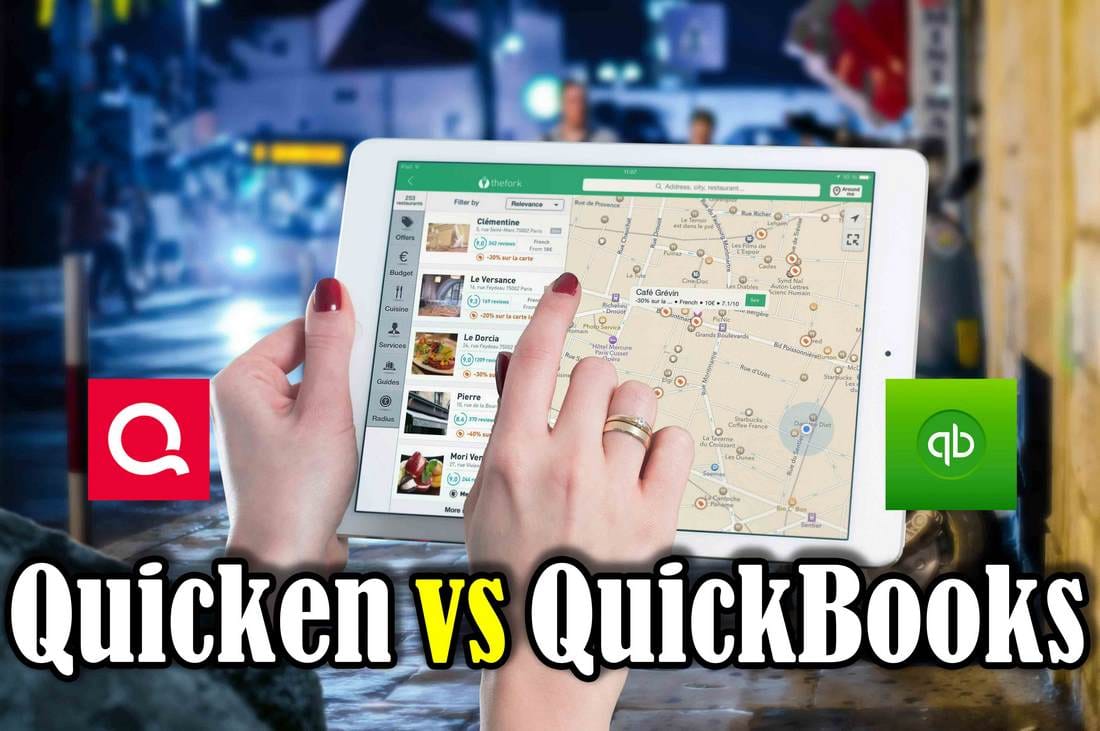Welcome to the Ultimate Financial Showdown: QuickBooks vs Quicken! Why Choosing the Right Budgeting Tool Matters
In today’s fast-paced financial landscape, selecting the perfect budgeting software can make or break your money management game. Let’s delve into the realms of QuickBooks and Quicken to see which tool aligns with your fiscal needs and goals.

Understanding QuickBooks
What is QuickBooks?
QuickBooks stands tall as a robust financial software that caters to businesses of all sizes. It streamlines accounting tasks, from invoicing to bookkeeping, ensuring financial harmony.
Features and Benefits of QuickBooks
With QuickBooks, you gain access to a plethora of features designed to simplify your financial processes. Enjoy seamless invoicing, expense tracking, and insightful reporting tools that empower you to make informed decisions.
User Interface Demystified: Navigating QuickBooks
Navigating QuickBooks may seem daunting at first glance, but fear not! Its user-friendly interface guides you through each financial task, making money management a breeze for novices and seasoned professionals alike.
Money Management Made Easy: Budgeting with QuickBooks
Budgeting is a breeze with QuickBooks. Create customized budgets, track expenses, and monitor cash flow effortlessly, empowering you to stay on top of your financial game.
Reporting and Analytics: How QuickBooks Helps You Track Finances
QuickBooks doesn’t just stop at basic budgeting. Dive into advanced reporting and analytics features to gain deep insights into your financial health, enabling strategic decision-making and future planning.

Exploring Quicken
Introducing Quicken: Your Personal Finance Assistant
Quicken steps onto the stage as your personal finance assistant, tailored to meet individual financial needs. From budgeting to investments, Quicken offers comprehensive tools to streamline your money matters.
Key Features of Quicken
Explore the treasure trove of features Quicken has to offer. Dive into budget management, investment tracking, and bill payment solutions, all aimed at simplifying your financial journey.
Interface Insights: Getting Started with Quicken
New to Quicken? Fear not! Its intuitive interface guides you through setting up your financial profile, ensuring a smooth and seamless onboarding experience for users of all skill levels.
Budgeting Bliss: How Quicken Helps You Plan and Save
Unlock the potential for budgeting bliss with Quicken. Seamlessly plan your finances, set financial goals, and pave the way for a secure financial future with this intuitive tool.
Monitoring Your Financial Health: Reports and Insights in Quicken
Stay ahead of the financial curve with Quicken’s robust reporting and insights. Track expenses, analyze trends, and gain a panoramic view of your financial health to make proactive decisions.

Comparing User Experience: QuickBooks vs Quicken
User-Friendliness: QuickBothe financial software realm. QuickBooks offers extensive customization for businesses, while Quicken tailors its features to cater to individual financial preferences.
Accessibility: Mobile and Desktop Integration
In today’s digital age, accessibility is paramount. QuickBooks and Quicken provide seamless integration between mobile and desktop platforms, allowing users to manage their finances anytime, anywhere.
Feature Face-Off
Budgeting Tools: QuickBooks vs Quicken
When it comes to budgeting tools, QuickBooks offers robust features for businesses, while Quicken focuses on personal finance management, providing tailored solutions for individual users.
Tracking Expenses: How Each Software Stacks Up
Dig deep into expense tracking features to see how QuickBooks and Quicken fare in helping users monitor and manage their spending habits effectively.
Investment Tracking and Planning: Which Does It Better?
For users keen on tracking investments, QuickBooks and Quicken vary in their approaches. Discover which software aligns with your investment tracking and planning needs.

Cost Considerations
Pricing Plans: QuickBooks Editions Compared
QuickBooks offers a range of editions to accommodate businesses of various sizes. Compare pricing plans to select the edition that best suits your financial requirements.
Subscription vs One-Time Purchase: Quicken’s Pricing Model
In the realm of financial software, pricing models play a crucial role. Unveil the subscription system of Quicken and explore whether it aligns with your budgeting preferences.
Security and Support
Data Security: How QuickBooks and Quicken Protect Your Financial Information
Securing your financial data is non-negotiable. Discover the security measures QuickBooks and Quicken employ to safeguard your confidential information from potential threats.
Customer Support: Which Platform Offers Better Assistance?
In times of need, reliable customer support is a beacon of hope. Compare the customer assistance services of QuickBooks and Quicken to ensure you have a safety net for any queries or concerns.

Making Your Decision
Factors to Consider Before Choosing: Quick Recap
Recap the essential factors to consider before making your final decision between QuickBooks and Quicken, ensuring your choice aligns seamlessly with your financial goals and aspirations.
Personalized Recommendations Based on Your Financial Goals
Receive tailored recommendations based on your unique financial objectives and needs, guiding you towards selecting the ideal financial software that complements your lifestyle.
Bottom Line
Final Thoughts: Choosing the Ideal Financial Software
As we reach the end of this financial face-off, arm yourself with insights and knowledge to make an informed decision between QuickBooks and Quicken. Select the financial software that resonates with your financial vision and sets you on the path to fiscal success.
Frequently questions (FAQs) about QuickBooks vs Quicken
What are the primary differences in target users between QuickBooks and Quicken?
QuickBooks caters to businesses of all sizes, offering features that support comprehensive business management, including accounting, payroll, and inventory tracking. In contrast, Quicken is geared towards personal finance management for individual users, focusing on budgeting, expense tracking, and investment management (Accounting Smarts) (Fundera).
How do QuickBooks and Quicken differ in terms of their budgeting functionalities?
QuickBooks provides robust budgeting functionalities for businesses, including detailed invoicing, expense tracking, and financial reporting. This makes it suitable for managing the financial aspects of a business. On the other hand, Quicken focuses on personal budget management and investment tracking, helping individuals monitor and manage their personal finances and small rental properties (Accounting Smarts) (Fundera).
Which platforms offer better accessibility between QuickBooks and Quicken?
Both QuickBooks and Quicken offer seamless integration between mobile and desktop platforms. QuickBooks Online is a cloud-based solution, providing access from any location with internet connectivity. Quicken Home & Business is primarily desktop-based but offers some web and mobile access for users who opt-in to these features (Accounting Smarts) (Fundera).
What pricing models do QuickBooks and Quicken follow, and how do they differ?
QuickBooks follows a monthly subscription model with various pricing plans tailored to different business needs:
- Simple Start: $25/month
- Essentials: $50/month
- Plus: $80/month
- Advanced: $180/month
Quicken, in contrast, operates on an annual subscription basis, with different plans for personal finance management:
- Starter: $35.99/year
- Deluxe: $49.99/year
- Premier: $74.99/year
- Home & Business: $99.99/year (Accounting Smarts) (Fundera).
How do QuickBooks and Quicken approach data security for protecting users’ financial information?
Both QuickBooks and Quicken prioritize data security to protect users’ financial information. They employ robust security measures, including data encryption and secure login protocols, ensuring a secure user experience and safeguarding against potential threats (Fundera).
Is Quicken a good software?
Quicken is generally considered a good personal finance software for managing budgets, tracking expenses, and planning investments. It’s well-suited for individuals and families looking to manage their finances more effectively, with features tailored for personal use rather than business.
Can you use Quicken without a computer?
Quicken is primarily designed to be used on a computer, but there are mobile apps available that allow you to access your financial data on the go. However, for full functionality and detailed financial management, a computer is typically needed.
Is Quicken only for us?
No, Quicken is not exclusive to the U.S., but it is primarily designed with U.S. financial practices and institutions in mind. Quicken is available in other countries with features tailored to local financial regulations, though it may not be as comprehensive or widely used outside the U.S.
Why are people leaving QuickBooks?
People may leave QuickBooks for various reasons, including dissatisfaction with the software’s complexity, cost, or customer support. Some users find alternatives that better fit their specific needs, such as more specialized software or platforms with better integration features.
Why not use QuickBooks?
Some users might avoid QuickBooks due to its higher cost, steep learning curve, or complexity in managing certain types of financial tasks. Alternatives might offer more user-friendly interfaces or better features for specific industries or business sizes.
Why is QuickBooks better?
QuickBooks is often considered better for businesses due to its extensive features tailored for accounting and financial management, such as invoicing, payroll, and tax preparation. Its scalability, integrations with other business tools, and comprehensive support make it a strong choice for many businesses.
Why don’t big companies use QuickBooks?
Large companies may not use QuickBooks because it is designed primarily for small to medium-sized businesses. Bigger companies often require more advanced, customizable, and scalable solutions to handle their complex financial needs, which might be better served by enterprise-level accounting software.
When should I stop using QuickBooks?
You might consider stopping using QuickBooks if your business outgrows its capabilities, if you need features not supported by QuickBooks, or if you find a more suitable or cost-effective solution that better fits your evolving needs.
Do accountants use Excel or QuickBooks?
Accountants often use both Excel and QuickBooks. Excel is useful for custom data analysis, financial modeling, and reporting, while QuickBooks is used for managing day-to-day accounting tasks, transactions, and financial reporting.
Do CPA firms use QuickBooks?
Many CPA firms use QuickBooks, especially when working with small to medium-sized clients. QuickBooks provides a robust platform for managing client accounting needs, but CPA firms may also use other software based on the specific requirements of their clients.
Which industry uses QuickBooks the most?
QuickBooks is widely used across various industries, but it is particularly popular among small businesses in sectors such as retail, construction, professional services, and hospitality. Its versatility and user-friendly features make it a favored choice for many types of businesses.
Key Takeaways
Overview: The article explores the showdown between two prominent financial software tools, QuickBooks and Quicken, shedding light on their features, usability, and suitability for diverse financial needs.
Importance of Choosing the Right Tool: Selecting the appropriate budgeting software is crucial for effective money management, enabling individuals and businesses to streamline financial tasks efficiently.
Detailed Comparison: The article delves into a detailed comparison of QuickBooks and Quicken, highlighting their key features, user interfaces, budgeting capabilities, reporting tools, and user experiences.
User-Friendliness and Customization: QuickBooks and Quicken focus on user-friendliness and offer varying levels of customization, catering to the distinct financial styles and preferences of their users.
Accessibility and Integration: Both software tools prioritize accessibility through seamless integration across mobile and desktop platforms, enhancing user convenience and flexibility in managing finances.
Budgeting and Expense Tracking: QuickBooks excels in offering robust budgeting tools for businesses, while Quicken specializes in personalized budget management and expense tracking for individual users.
Investment Tracking and Planning: The article compares the investment tracking features of QuickBooks and Quicken, guiding users in selecting the software that best aligns with their investment goals.
Cost Considerations: By comparing pricing plans and models, the article helps users understand the financial commitment associated with both QuickBooks and Quicken, enabling informed decision-making.
Security and Support: Data security measures and customer support services are crucial factors to consider when choosing financial software, ensuring the protection of sensitive financial information and access to timely assistance.
Making Your Decision: The article provides a recap of essential factors to consider before making a final decision between QuickBooks and Quicken, offering personalized recommendations based on individual financial goals and preferences.
Some Sources
Is Quicken a good software?
- Source: PCMag
Summary: Reviews and compares Quicken among other personal finance software options, evaluating its strengths and weaknesses.
Can you use Quicken without a computer?
- Source: Quicken Support
Summary: Provides information on accessing Quicken through mobile apps, allowing some functionality without a computer.
Is Quicken only for us?
- Source: Quicken
Summary: Details the availability and features of Quicken for users outside the U.S.
Why is QuickBooks better?
- Source: Business News Daily
Summary: Highlights the reasons QuickBooks is considered a strong choice for many businesses, including its features and benefits.
Why don’t big companies use QuickBooks?
- Source: Business.com
Summary: Explains why large enterprises might prefer other accounting solutions over QuickBooks.
Do accountants use Excel or QuickBooks?
- Source: Accounting Today
Summary: Discusses the use of both Excel and QuickBooks by accountants for different financial tasks.
Do CPA firms use QuickBooks?
- Source: The CPA Journal
Summary: Examines how CPA firms use QuickBooks and other software in their practices.
Which industry uses QuickBooks the most?
- Source: QuickBooks
Summary: Provides insights into which industries are most commonly using QuickBooks for their accounting needs.









